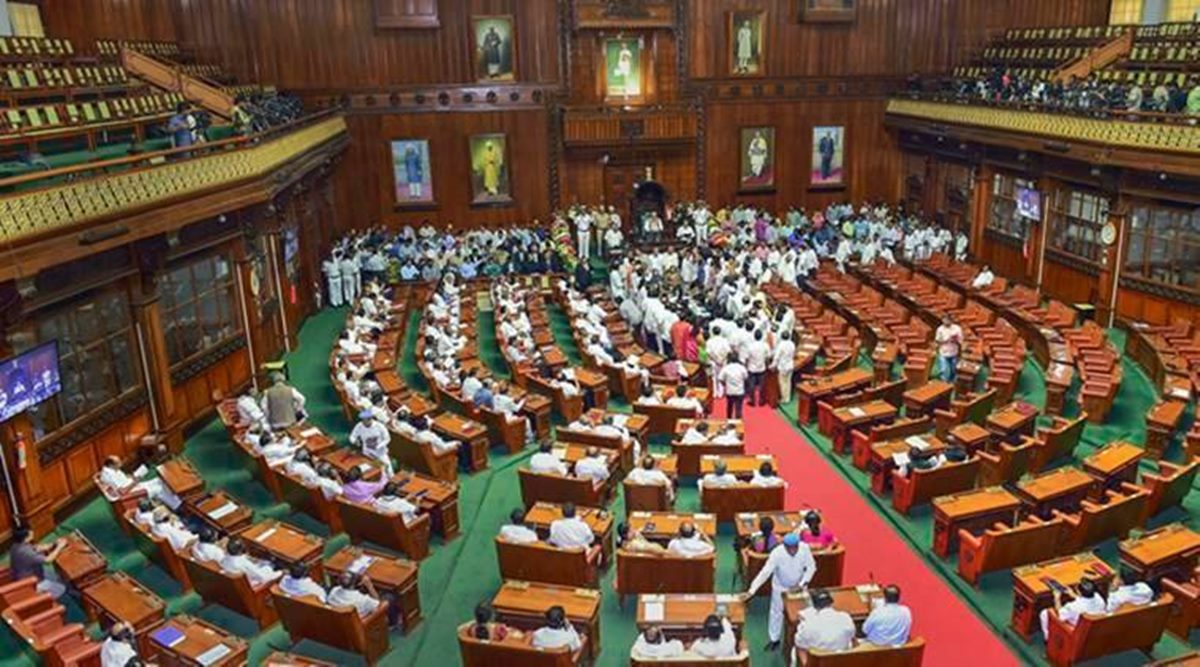Stay updated with the latest - Click here to follow us on Instagram
Karnataka passes bill allowing 12-hour work days in industries, weekly work hours to remain at 48 hours
The amended law allows women to work night shifts with adequate security and also allows overtime to extend from 75 hours to 145 hours in three months.
 The Factories (Karnataka Amendment) Bill, 2023 was passed without a debate in the Legislative Assembly but was opposed by the Congress, JDS, and even a member of the BJP, in the Legislative Council. (File)
The Factories (Karnataka Amendment) Bill, 2023 was passed without a debate in the Legislative Assembly but was opposed by the Congress, JDS, and even a member of the BJP, in the Legislative Council. (File) The Karnataka legislature has passed an amendment to the Factories Act of 1948 in its application in the state to allow industries to extend working hours for labour up to 12 hours a day while keeping the maximum weekly work hours at 48.
The Factories (Karnataka Amendment) Bill, 2023 was passed without a debate in the Legislative Assembly but was opposed by the Congress, JDS, and even a member of the BJP, in the Legislative Council when the law was passed on February 24 amid a walkout.
IT and BT Minister Dr C N Ashwathnarayan told the Legislative Council that the extension of working hours was being done to provide a boost for the manufacturing sector where India is lagging behind China. The amended law allows overtime to extend from 75 hours in three months to 145 hours and also allows women to work night shifts with adequate security.
“Now, the rule is that workers should work for 48 hours and the aim is to reduce work from six days a week to four or five and in a total week, the work still remains at 48 hours. In the case of those working for 10 hours a day, the workers will work for five days a week and those who work for eight hours a day will work for six days a week,” Ashwathnarayan said.
“At present, 75 hours of overtime is allowed in a period of three months. We want to enhance the overtime hours to 145 hours. We also want women to work night shifts, from 7 pm in the evening to 6 am in the morning,” the minister said while tabling the bill in the Upper House of the legislature.
“India is in competition with places all around the world to attract investments. Only when you have flexible labour laws, investments can be attracted. China is a manufacturing base today and is part of the global supply chain along with South Korea, Indonesia, Vietnam, Cambodia, and Japan,” he said.
During the industrial revolution, the manufacturing sector did not develop in India and the state government wants to develop a base in the electronics sector since many incentives have been offered by the GOI, the minister said.
The bill was opposed as anti-labour by the BJP MLC and former MP Ayyanur Manjunath among others.
“This will be an anti-labour law if it is generalised and it must be specified as being applicable to a particular sector. Unfortunately, it was not discussed in the Vidhan Sabha, there were no discussions with trade unions and it is slavery to exploit workers for 12 hours in a day,” Manjunath argued.
“The law is meant to increase production. Let companies hire more people. With the interest of company owners in mind, this law has been brought. Women will have to wake up at 4 am to report for work at 6 am. Can a driver work for 12 hours and what happens to mental and physical faculties when they work for 12 hours in a day? It creates danger,” he said.
“A human should not be treated like a machine. Even in the legislature, when we work for seven to eight hours, we get tired. Was the law studied by any experts? What are the labour laws in the G20 countries? Let there be a scientific study of the law and its consequences,” he said. BJP leaders who do not belong to the elite class must not allow this to happen, he said.
He was supported by Congress’s P R Ramesh and JDS’s Marithibbe Gowda.
Law Minister J C Madhuswamy argued that the government was not making it compulsory for industries to impose 12-hour work days. “It is not a compulsory law and it is a flexible law. Manpower in industries is low in the country. The maximum hours remain at 48 hours a week. We have not mandated any industry. We are facilitating agreements between industry and labour. It is as per the law but if someone wants to work 12 hours it can be done,” he said.
Manjunath staged a walkout with Ramesh and Marithibbe Gowda when the bill was passed by the Legislative Council last week.
According to the statement of reasons in the bill, the changes in working hours are necessary to “create more economic activities and employment opportunities”.
The law allows the state:
* To increase the number of hours of work from the existing nine hours up to 12 hours, inclusive of rest intervals on any day, subject to a maximum of 48 hours in any week
* To extend the total number of hours of work by a worker without an interval to six hours to any group or class or description of factories to facilitate the increase in the daily maximum hours of work
* To prescribe the hours of work in any day or in any week above which wages at the rate of twice the rate of ordinary in respect of overtime work is payable to a worker in respect of overtime work and allows factories to engage workers on overtime for an increased period of time in a quarter to deal with “an exceptional press of work”
* To enable the employment of women workers on overtime work, providing for equality and equal opportunity to work and earn, and also to enable employment of women round the clock subject to the conditions to secure safety and health of the woman workers working in night shifts, upon obtaining written consent from the woman workers who are interested to work in night shifts.







